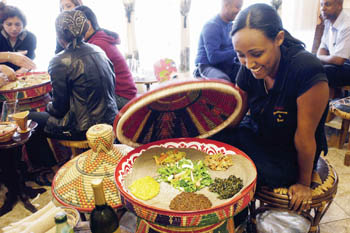Book a table online.

Photograph by Paolo Vescia
Mesob Bonhomie: Ethiopia's traditional basket table, the mesob, uncovers a fun, informal dining experience.
Zeni Philosophy
Ethiopian restaurant celebrates communal pleasures of eating
By Stett Holbrook
IT'S IRONIC that Ethiopia, a country many Americans associate with poverty and bloated bellies, has given us one of the world's most generous and satisfying cuisines. At Ethiopian restaurants, everyone eats off the same platter, a practice that, I think, reinforces the simple pleasure of eating good food in the company of friends and family.
Zeni Ethiopian Restaurant, named after co-owner and chef Zeni Gebremariam, tops my list of Bay Area Ethiopian restaurants. Aside from the fine food, part of the pleasure of eating here is the bonhomie that pervades the meal. Abe Feki, Gebremariam's husband and co-owner, says communal dining in Ethiopia helps stretch sometimes meager food stocks and ensures everyone gets something to eat. It's also a powerful way to maintain family bonds, he says.
Zeni is usually filled with Ethiopian expats and a mix of ethnically diverse diners who know they've found something good. A palm-thatched bar serves surprisingly potable Ethiopian wine as well as beer and cocktails. The dining room is divided in two. On one side is the typical, Western-style table-and-chair setup. It's pleasant enough, but through an archway is an exotically furnished room that makes the other side look black and white in comparison. Here, you sit on low stools or fur-covered chairs around a colorful, straw basket table called a mesob.
Central to the Ethiopian food is injera, a spongy, pancakelike bread. Injera is tangy unleavened bread made from teff, an ancient Ethiopian grain. You scoop up your food with a piece of the bread, using it in place of utensils. It also lines the bottom of platters, absorbing juices and bits of food so that nothing is wasted. But be careful how much injera you eat. It has a sneaky way of expanding in your stomach, taking you from pleasantly satiated to painfully full in a few minutes.
The vegetarian ($9) and meat combinations ($11) offer a great introduction to Ethiopian food. The vegetarian sampler includes yewmir wot, puréed, dal-like red lentils simmered in a rich berberé sauce. Berberé is the signature seasoning in Ethiopian food. Like curry, it combines about a dozen spices including clove, cinnamon, paprika, cumin, red chiles, fenugreek and black pepper. Combined with clarified butter, as it is in many dishes, it produces a complex, highly aromatic, spicy seasoning that's wonderfully addictive. I loved the kik alicha, split yellow peas puréed with onion, garlic, ginger and turmeric. And don't miss the unassuming but excellent gomen wot, sautéed collard greens.
From the meat combo, the beef kifto is the most unique. Described as Ethiopian steak tartare, the dish is available raw, medium or well done. We went for medium and got a buttery mound of lean ground beef enlivened with mitmita, a mild chile powder. For a full berberé experience, kei wot delivers chunks of lean beef simmered in the dark-red spice mixture and clarified butter. Berberé-seasoned food isn't hot out of the gate but smolders and slowly grows in intensity. Sprinkling a little lybe on your food, fresh house-made cow's milk cheese, can help temper the heat. The simple but good salad served with most dishes offers a cooling counterpoint as well.
While I usually avoid dishes made with chicken breast because they're so often too dry, ye doro tibs ($9.50) did me right. The dish is a sultry braise of chicken chunks with onions, tomatoes, jalapeños and clarified butter.
For the complete Ethiopian dining experience, we called ahead to order the traditional coffee ceremony ($25). Ethiopia, not Juan Valdez's Colombia, is the birthplace of coffee, and the beverage plays a special role in Ethiopian culture and is always consumed with friends and neighbors, never alone.
For the tableside ceremony, a server roasts green coffee beans in a skillet and burns a pleasing, pine tar-scented incense. The coffee is then ground and poured from a clay pot into small cups and served with popcorn, a traditional accompaniment.
If I have one gripe about Zeni, it's the service. The waitresses are uniformly polite but rather mute. I expected a narration to accompany the coffee ceremony, but instead we just got coffee and smiles. The food and traditions of Ethiopia are sure to be new to many, and it would be helpful to hear more about them. But I quibble. Sitting around the mesob with friends and lingering over coffee makes it easy to enjoy yourself and the pleasures of good food and drink.
Zeni Ethiopian Restaurant
Address: 1320 Saratoga Ave., San Jose
Phone: 408.615.8282
Hours: 11:30am-10pm Tue-Thu, 11:30am-11pm Fri, noon-11pm Sat, noon-10pm Sun
Price range: $6-$11
Send a letter to the editor about this story to letters@metronews.com.
[ Silicon Valley | Metroactive Home | Archives ]
![[Metroactive Dining]](/dining/gifs/dining468.gif)